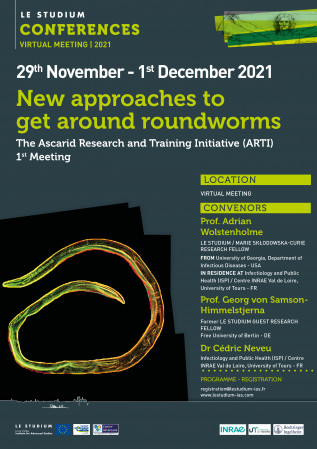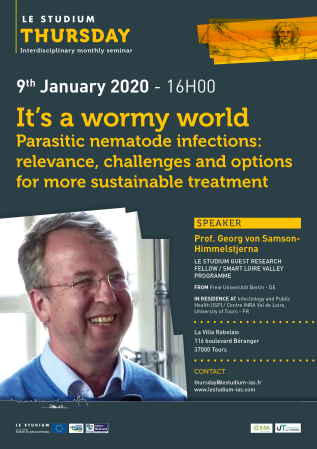Prof. Georg von Samson-Himmelstjerna

From
Free University of Berlin - DE
In residence at
Infectiology and Public Health (ISP) / Centre INRAE Val de Loire, University of Tours - FR
Host scientist
Dr Cédric Neveu
Biography
Dr. Georg von Samson-Himmelstjerna is Professor for Parasitology and director at the Institute for Parasitology and Tropical Veterinary Medicine, Freie Universität Berlin, Germany. Before his current employment he was Professor for Molecular Parasitology at the University of Veterinary Medicine Hannover (TiHo). Germany where he previously also obtained his degree in veterinary medicine, his doctorate and his habilitation in veterinary parasitology. From 1996 to 2000 he was employed by Bayer AG as head of the laboratory for molecular helminthology and was active in the development of several new antiparasiticides. His main research interests include the molecular investigation of the mode of anthelmintic action and mechanisms of antiparasiticide resistance. Particularly the issue of anthelmintic resistance in equine gastro-intestinal parasites has been an area to which he conducted numerous fundamental research and field studies. Since 2021 he is the speaker of the board of the Veterinary Center for Resistance Research (Tiermedizinische Zentrum für Resistenzforschung, TZR) at the department of Veterinary Medicine, FU Berlin (https://www.vetmed.fu-berlin.de/en/einrichtungen/sonstige/tzr/index.html). He has (co-)authored more than 240 scientific publications which received over 12500 citations and his current h-index is 59 (google scholar 24.07.2023).
Project
Drug efflux-mediated processes of anthelmintic resistance in ascarids
Infections with gastro-intestinal tract helminths parasites occur in all animal species, potentially leading to significant impairment of the development and health of infected individuals. In animals, infections with gastro-intestinal-nematodes (GIN) are of highest relevance as it affect each and every grazing animal. The largest GIN are roundworms/ascarids which can grow up to 50 cm in length and residing in the small intestine not only deprive the host from nutrients but in case of high infection intensities can also lead to intestinal obstruction. This also applies to ascarid infections in man, which are considered to occur in approx. 800 million globally, of which especially children are most often affected. In the absence of any vaccine for protection, treatment and control of ascarid infections heavily relies on the application of anthelmintic drugs. As commonly known also in bacterial infections this has led to the development and spread of drug resistance in GIN, which for example in the horse ascarid Parascaris univalens nowadays even is evident for all available anthelmintic drug classes, lately also including benzimidazoles (BZ). However, also in humans, where BZs are the only used anthelmintics in mass-drug-application campaigns performed in endemic countries, there is concern of loss of efficacy of this drug class. It is thus of highest One Health relevance to improve our currently poorly developed understanding of BZ resistance mechanisms in ascarids. Herein researchers from FU Berlin, Germany and INRAE Nouzilly, France will join to explore new scientific and experimental avenues to examine BZ efflux mediated processes in ascarids by heterologous expression using the model nematode Caenorhabditis elegans. It is expected, that by functional analysis of P-glycoprotein mediated BZ transport characteristics the current understanding of drug metabolism in nematodes and thus putative resistance pathways will be significantly extended. This and a new approach for identification of CRISPR/Cas9 generated recombinant C. elegans lines promises innovative future research opportunities.
Publications
Final reports
Infections with parasitic helminths expose serious health threats to humans and animals alike. Prevention of disease is dependent on the effective treatment using anthelmintics. Unfortunately, anthelmintic resistance (AR) has evolved in many helminth species during the past decades and meanwhile poses a major constraint to established worm control approaches. This project aimed to improve our understanding of the molecular mechanisms by which helminths, particularly the potentially deadly horse parasite Parascaris sp., become capable of withstanding drug treatment. To this end, Parascaris P-glycoproteins (Pgp), belonging to an important group of mediators of anthelmintic resistance, were introduced into the model organism Caenorhabditis elegans using the CRISPR/Cas9 technology. The resulting transgenic lines will subsequently be analyzed to functionally elucidate the role of putatively AR-associated Parascaris Pgp sequence polymorphisms.
Helminth infections represent a major health threat for both humans and animals. In the latter they occur at often very high prevalences and on a global scale. Due to a near complete lack of immuno-prophylactic measures the metaphylactic use of chemotherapeutics i.e. the anthelmintics is the corner stone of worm control since decades. This has resulted in widespread anthelmintic resistance in a range of helminth species. Particularly the gastrointestinal nematodes and amongst them also so called roundworms or ascarids have evolved resistance. This results in an increasing clinical issue as like in horses the Parascaris spp. as well as in pigs or humans the Ascarais spp. often cause considerable clinical symptoms. To improve the sustainable use and provide solutions for the resistance problem it is important to understand the molecular mechanisms of anthelmintic resistance. In the present project the P-glycoprotein (Pgp) based drug efflux as a non-drug target associated mechanism of resistance is being addressed in Parascaris. To this end, the model nematode Caenorhabditis elegans was employed and the specific role of the Pgp3 was examined. The pharmacological profile of a Pgp3 knock out C. elegans line (VC 2338) was established using a panel of anthelmintic compounds and compared with the N2 wildtype strain. Furthermore, the Parascaris Pgp3 coding sequence was injected into the VC2338 to achieve recombinant expression under an intestinal promotor (ges1) as we have done it successfully with another Parascaris Pgp recently. Our results suggest that the Parascaris Pgp3 overexpression in C. elegans interferes with the development of the worm and ongoing investigations attempt to further elucidate the specific role of Pgp3 in the worms homoeostasis.


